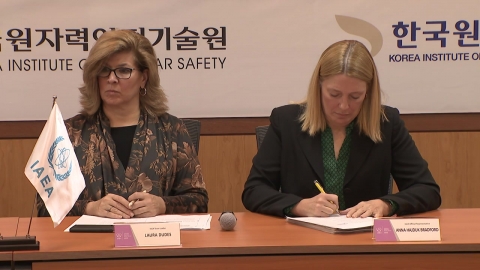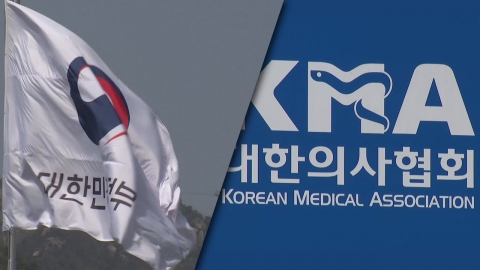■ Starring: Min Jeong-hoon, Professor of North American and European Studies at the National Diplomatic Academy
* The text below may differ from the actual broadcast content, so please check the broadcast for more accurate information. Please specify [YTN NewsON] when quoting.
[Anchor]
Russia said today that yesterday's launch by Russia toward Ukraine was a new nuclear-capable weapon, a hypersonic intermediate range ballistic missile. In response to Ukraine's first use of U.S. and British missiles, the "no-go" of long-range missile use, which both sides had refrained from for 1,000 days, has been lifted. Let's take a look at the war between Russia and Ukraine, which is at a critical juncture during the regime change in the United States. We have Min Jeong-hoon, a professor at the National Diplomatic Institute. Welcome.
It was from Ukraine that all the major media reported today. There were related reports because Ukraine claimed that Russia shot an ICBM and shot an intercontinental ballistic missile, but in the morning in Russia, President Putin said it was not an ICBM. Let's listen to the interview first. President Putin made such an unusual statement.
[Minjeonghun]
That's right. It's very unusual. So it's a clear demonstration of what interests Russia and Ukraine have now. Who would tell Ukraine to hear that Russia fired a long-range ballistic missile ICBM?
[Anchor]
United States, United Kingdom...
[Minjeonghun]
That's right. It's the United States and the United Kingdom, but in terms of distance, the country that needs ICBMs is the United States. So, with intermediate-range ballistic missiles, it can cover all of Britain and Europe. So, from President Putin's point of view, it is not an ICBM, but an IRBM, a medium-range ballistic missile.
[Anchor]
It is not directed at the United States.
[Minjeonghun]
That's right. In Ukraine, Russia responded to send a message to the U.S., but it responded with an ICBM. Its ultimate goal is the United States, this is how it delivered the message and not from the perspective of Russia, which has grasped the significance of the message. We did IRBMs and we did medium-range ballistic missiles. So this time, the U.S. and Britain allowed long-range missiles like Aetax and British medium-range missiles to hit the Russian mainland. Since it was launched, in fact, Russia has to respond to it.
There is a possibility that negotiations will proceed now in preparation for such a situation in which Trump will take power while responding.
That's why we have to coordinate that part. That's why Britain and NATO allies have allowed Russia to use long-range missiles, so they have responded by firing medium-range missiles and showing that all NATO allies in Europe are within the range of our missiles, but it's not an ICBM in preparation for the possibility of negotiations with the United States, and we had a very intense diplomatic battle to draw a line like this.
[Anchor]
Since it is a medium-range missile, the range is confirmed to be about 5,000km, but it is a new weapon that can be loaded with nuclear weapons. How should I interpret this new weapon?
[Minjeonghun]
I think it's showing off Russia's nuclear capabilities. So this time, the United States and the United Kingdom provided Ukraine with long-range missiles and allowed them to be used in mainland Russia. In response, Russia threatened to use a nuclear weapon called a more powerful weapon. The U.S. authorities don't budge on that part, I'm just saying they snorted. So there must have been a part where I got emotional about that. That's why I'm saying that there's no modern defense system that can shoot it down because it's not equipped with a nuclear warhead this time, but it's a new missile that can be equipped with a nuclear warhead and it's claimed to have a Mach 10 speed. This message was sent to Russia not to look down on us because its nuclear capabilities are superior.
[Anchor]
The message not to look down on us, and it's not ICBM for the United States. You said it was an indirect indication that you also intended to negotiate. Does Putin actually seem willing to negotiate, too?
[Minjeonghun]
That's right. In the case of President Putin, he kept talking. He kept saying that if the conditions are right, there is room to start negotiations and respond to negotiations, but the terms themselves are difficult for Ukraine and NATO member states to accept.
[Anchor]
Isn't it a conditional negotiation?
[Minjeonghun]
Even in this case, the conditions I put forward are like that. Ukraine is not allowed to join NATO. And it's not easy for Ukraine to accept because he's saying that he's going to negotiate while recognizing most of the territory that Russia now occupies. However, if negotiations proceed, I think both Ukraine and Russia are presenting a very high level of starting point for negotiations because they want to start negotiations from an advantageous position and high ground.
[Anchor]
We've prepared the graphics. Please show us the negotiation terms graphic that Putin has presented when you are ready. There are two things, big ones. There is a condition for Ukraine to give up its membership in NATO. And the territory of Ukraine that Russia occupies cannot be conceded. I wonder if there is a possibility that this will be successful.
[Minjeonghun]
I think I'll have to watch it. The most important condition for renegotiation is that Ukraine does not join NATO. I think there is some possibility of some coordination in this area, but I think we will negotiate very intensely in the territorial area. So, as shown on the screen, there are talks about Russia occupying up to 80% and 70% of Donetsk and Luhansk, so Russia cannot give all of this, from Russia's point of view. But we can't take away all the important points from Ukraine's point of view, right? So I think there will be a lot of negotiations on how to divide the territory exactly in this area.In any case, if President Trump starts his second term, he will start negotiations, and he will start negotiations in that area, and he will continue to negotiate in a difficult way, so I think that if that happens, it will be in the favor of Russia, which has room in all capabilities.
[Anchor]
Can Ukraine accept that?
[Minjeonghun]
Ukraine is also very tired. The people are now tired of war, so domestic support for President Zelensky has weakened. Therefore, considering this situation, we will have to watch the situation because there can be serious turbulence within Ukraine, and if so, wouldn't it be a realistic alternative to end the war while giving up some territory?
[Anchor]
In this part, where the Ukrainian people are tired of the war, the results of a recent poll came out, and I hope you show me the graphic when it's ready. While the people are getting very tired. Please show us the graphic. In the midst of this, foreign media also analyzed that the Korean model of maintaining prosperity and security without an official peace treaty could be the solution.
[Minjeonghun]
I think various scenarios are being presented. In the case of the Korean Peninsula model, it's a sad model.
has not been able to sign a peace treaty and only an armistice agreement is in progress, so isn't the Korean Peninsula a very important place in the world but always a key area of conflict? In that sense, we are judging that Ukraine is similar. So, considering the tension and the possibility of friction between Russia and NATO member states, Ukraine is needed, and as we discussed, it is difficult for either side to reach satisfactory negotiations.
Therefore, rather than signing a definitive peace treaty, the process is too difficult, so it is necessary to sign an armistice agreement as an intermediate step and manage it as a neutral zone. One more thing I want to tell you is that if the second Trump administration enters negotiations and negotiates to recognize the current border, it is very inconvenient for European and NATO countries. Because there is a territory that is recognized by international law, but it was illegally invaded and took away the territory. So, how can we secure the border if it is recognized by negotiating after taking it away? And because the border is very arbitrary, it is very inconvenient and can increase security anxiety, so we are very concerned about that possibility.
[Anchor]
You said that you can set a bad precedent. In the meantime, there are reports that a high-ranking North Korean general was injured in Ukraine's storm shadow attack.
[Minjeonghun]
That's right. Considering the situation in the North Korean military, everyone was thinking that it was inevitable that there were casualties. It's almost the first time since the Korean War that North Korean troops have actually been put into combat. You're not familiar with such situations and Russian terrain. And in a situation where it was impossible to communicate with the Russian military due to language barriers, it was put into practice after short adaptation training in a short period of time, and of course, the casualties were higher than those of the Russian military. Because such a situation was inevitable, I said that the Korean government will have no choice but to become a bullet holder, and I think that such expectations will come true.
[Anchor]
It is known that there are three North Korean commanders sent to Russia, so I would like you to show us the graphic we have prepared. Is it possible that he was injured on the
war footing?
[Minjeonghun]
That's right. There are casualties, but now that the war is going on, there is some talk about the possibility of being injured among high-ranking generals, and it seems difficult to determine the truth of this. The Ukrainian side is going to talk about the situation in a very exaggerated way, and Russia is going to downplay it, so we'll have to wait and see.As I said, there are situations in which general or private soldiers lack practical experience, so I think there are many situations in which this will be damaged by other situations, whether it is an ally's attack, a mistake, or an enemy's attack.
[Anchor]
This hasn't been confirmed exactly officially. However, Shin Won-sik, head of the National Security Office, appeared on a broadcast program today and said that Russia provided air defense equipment and anti-aircraft missiles in exchange for the dispatch of North Korean troops. Have you received all the air defense equipment, anti-aircraft missiles, and various technologies supported by Russia?
[Minjeonghun]
There's a possibility. So, when the North Korean military sent troops to Russia this time, who wanted more and who benefited more, North Korea will be able to benefit much more than Russia. Perhaps through the dispatch of troops, the military and economic support that you mentioned from Russia. So, I think you must have expected a lot because you can receive the very important power that North Korea needs. Don't we have advanced military technology? Considering the conventional capabilities of the North Korean military, it is quite lagging in focusing on ICBM reentry technology and SLBM launch capabilities. In that sense, reinforcing the air defense network you mentioned, supporting anti-aircraft missiles, and modernizing these conventional weapons are important military support that the North Korean military really wants. In that respect, if Russia provides any high-tech weapons, wouldn't it be less burdensome in the case of conventional weapons? In addition to economic support, I think this level, low level of conventional weapons would have been supported.
[Anchor]
In the meantime, North Korean leader Kim Jong-un has expressed his position for the first time since former President Trump's election. Negotiations with the United States, I said I've been as far as I can go. Did you express your intention to refuse to talk?
[Minjeonghun]
I don't think so. I think I've created a foundation for conversation.
[Anchor]
Is it an increase in ransom?
[Minjeonghun]
That's right. I've already tried to increase my bargaining power, but it didn't work out properly. And as is well known, wasn't it desperate after the failure of the Hanoi summit in 2019? Therefore, since we believe that we have made great efforts to advance our nuclear armament and have made considerable progress, we will of course make efforts to increase our negotiating power. Then you'll think that the ransom has also increased. That's why I've been there so far, so as I told you while drawing a line on the possibility of renegotiation, we need to secure the strongest defense capability for security. Aren't you talking about this? So, I'm thinking that if I raise the ransom to the maximum before negotiating and create an atmosphere, I'll quietly come back to negotiations.
[Anchor]
It's not a refusal by any means. Rather, he said that it could be a message that he wants to talk to. Thank you very much. I talked with Min Jeong-hoon, a professor at the National Diplomatic Institute. Thank you.
※ 'Your report becomes news'
[Kakao Talk] YTN Search and Add Channel
[Phone] 02-398-8585
[Mail] social@ytn. co. kr
[Copyright holder (c) YTN Unauthorized reproduction, redistribution and use of AI data prohibited]






![[Y Issue] The last hint of New Jeans, sobbing eyelet...Trophies of Girls Who Can't Laugh](https://image.ytn.co.kr/general/jpg/2024/1122/202411221530125174_h.jpg)


